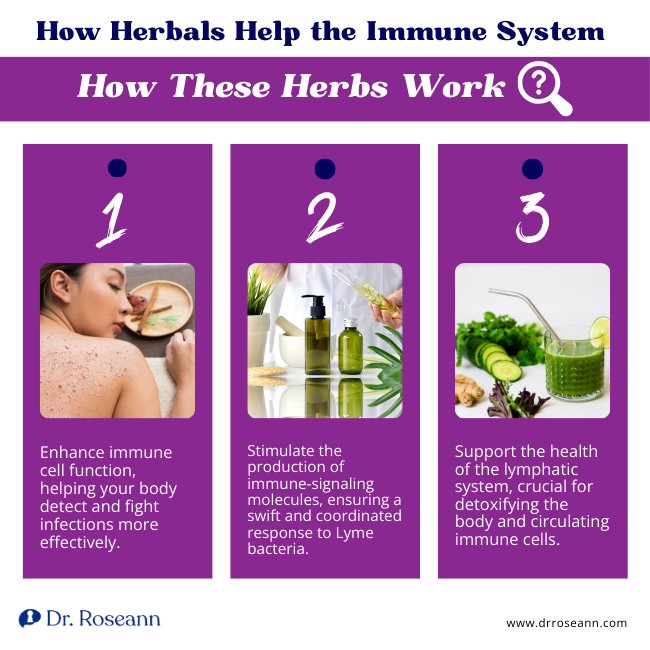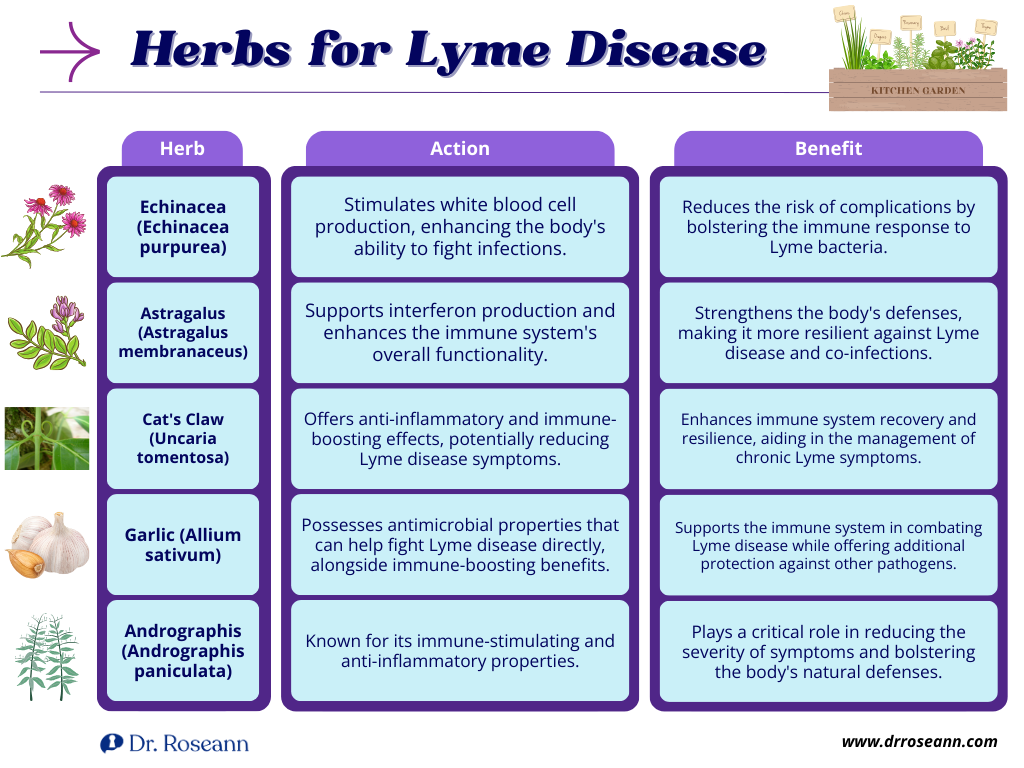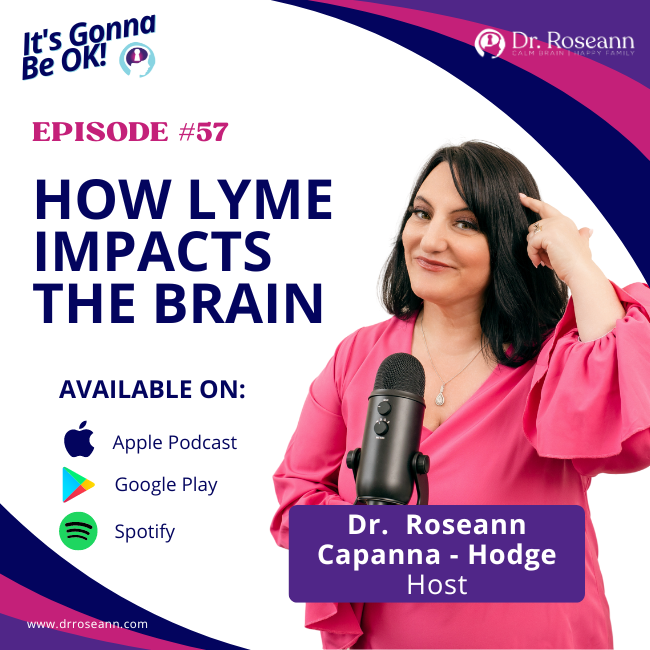Lyme disease is unnecessarily tough to get proper diagnosis and help. It's easy to overlook the symptoms that vary from person to person and very hard to find a seasoned expert who understands the symptoms they are seeing.
People fly in all over the world to see me – searching for answers to why they or their child has layered and often serious mental health symptoms.
With delayed diagnosis comes delayed treatment. Moreover, most aren’t told about herbal treatments until they find out about it in a desperate internet search. And for most of my patients, I have seen that herbal treatments can be an effective primary or adjunctive treatment for Lyme and Tick-borne illness.
Herbal treatment for Lyme disease isn't just about fighting symptoms. It's about embracing a holistic approach that honors the intricate dance between body, mind, and spirit. It is important to explore the potent effects of herbal treatment for Lyme disease and how they can offer a safe, natural alternative to conventional therapies.
What is Lyme Disease?
Lyme disease is a bacterial infection caused by the spiral-shaped bacterium Borrelia burgdorferi. It is primarily transmitted to humans through the bite of infected black-legged ticks, also known as deer ticks. These ticks are commonly found in wooded and grassy areas, particularly in regions with dense deer populations, which serve as hosts for the ticks during their life cycle.
Lyme disease often flies under the radar, masquerading as many other illnesses due to its wide range of symptoms. Its symptoms can be flu-like, such as fever, chills, fatigue, and muscle aches, but there can be more severe manifestations like joint pain, neurological issues, and even heart problems. Lyme disease can mimic various conditions, making it notoriously difficult to diagnose.
Most of my patients, just like the statistics show, that it takes many physician visits before they get a proper diagnosis.
If left untreated, Lyme disease can lead to chronic symptoms that persist long after the initial infection. This chronic form of Lyme disease can be debilitating, impacting every aspect of daily life and causing profound physical and emotional distress.
Why Natural Cure for Lyme Disease a Safe and Natural Alternative
Herbal treatment for Lyme disease isn't just about combating symptoms. It's about harnessing nature's innate healing powers. Unlike synthetic drugs, which often come laden with side effects and long-term consequences, herbs offer a gentle yet potent alternative that aligns harmoniously with the body's healing mechanisms.
Its holistic approach targets the bacteria responsible for the infection and nourishes and strengthens the body from within. These botanical wonders have been cultivated and revered for centuries, passed down through generations as potent remedies for many ailments.
Safety and efficacy make herbal treatment for Lyme disease truly special. Unlike antibiotics, which can disrupt the delicate balance of the body's microbiome and lead to antibiotic resistance, herbs work in synergy with the body. They support its natural defenses and promote overall wellness. They offer a gentle yet powerful solution that honors the interplay between body, mind, and spirit.
Moreover, herbal treatments for Lyme disease have stood the test of time. These ancient remedies have been used for generations by cultures worldwide, proving their effectiveness. Herbs have been central in restoring health and vitality to countless individuals throughout history.

The Role of Herbal Treatment in Managing Chronic Lyme Disease Symptoms
Herbal Lyme disease treatment can help address the endless cycles of antibiotics and the harsh side effects that often accompany them. It offers a holistic treatment for Lyme disease that affects the body, mind, and spirit.
When it comes to Lyme disease, herbs play a multifaceted role, acting not only as antibiotics but also as immune boosters and detoxifiers.
1. Antibacterial Properties
Many herbs contain potent antibacterial compounds to help combat the Lyme bacteria Borrelia burgdorferi. Japanese knotweed, for example, is rich in resveratrol and polyphenols, which have been shown to inhibit the growth of Lyme bacteria (Thompson et al., 2023). Similarly, Ghanaian quinine and cryptolepis sanguinolenta are revered for their antibacterial properties, making them valuable allies in the fight against Lyme.
These antibacterial herbs disrupt the essential processes of bacterial growth and replication, effectively targeting and neutralizing Lyme bacteria within the body. Incorporating these herbs into your treatment regimen can supplement or even replace conventional antibiotics, reducing the risk of antibiotic resistance and minimizing side effects.
2. Immune-Boosting Properties
Many herbs boast antibacterial effects and immune-boosting properties to help strengthen the body's natural defenses against Lyme and other pathogens. Echinacea, for instance, stimulates the production of white blood cells, which play a crucial role in fighting infections. Astragalus, another immune-boosting herb, supports interferon production and is crucial in the body's immune response.
Bolstering the immune system with herbs helps fend off Lyme bacteria and promotes overall wellness and resilience. A robust immune system is better equipped to handle the challenges posed by Lyme disease as it reduces the severity and duration of symptoms and supports the body's ability to heal (Strasheim, 2009).
3. Detoxifying Properties
Lyme disease and its treatment can significantly burden the body's detoxification pathways, accumulating toxins and impurities. Thankfully, many herbs excel at supporting detoxification, helping to rid the body of harmful substances and restore balance to cellular function.
Milk thistle, for example, is renowned for its ability to support liver health and promote detoxification. Dandelion and burdock root are prized for their diuretic properties, which help flush toxins from the kidneys and urinary tract.
These detoxifying herbs work synergistically with the body's natural detoxification mechanisms, promoting elimination of waste products and restoring vitality to cells.
Herbal Treatment and Lyme Disease Symptoms
Fatigue, joint pain, brain fog, and mood swings are just a few of the formidable symptoms that Lyme disease throws your way. Fatigue removes your vitality and leaves you feeling drained and defeated. Adaptogenic herbs like ashwagandha and Rhodiola work tirelessly to restore balance to your energy levels and help you reclaim your zest for life one day at a time.
Joint pain is a constant reminder of the havoc wreaked by Lyme bacteria on your body. Herbs like turmeric and ginger boast powerful anti-inflammatory properties to soothe your aching joints and restore mobility with each soothing sip of herbal tea.
And what about brain fog, that frustrating fog that clouds your thoughts and steals your clarity of mind? Here, herbs like ginkgo biloba and gotu kola can help sharpen your mental acuity and address Lyme disease's confusion over your cognition.
Last but not least, mood swings. These strong emotions leave you feeling like you're on shaky ground. Herbs like St. John's wort and lavender are here to offer solace, gently calming your frazzled nerves and restoring a sense of balance to your emotional landscape.
Incorporating herbs with antibacterial, immune-boosting, and detoxifying properties into your Lyme disease treatment plan allows you to harness the multifaceted power of nature to support healing and restore balance to your body. Whether used alone or with conventional therapies, herbs offer a gentle yet potent approach to combating Lyme disease and reclaiming your health and vitality.

More Herbal Remedies for Lyme Disease
Parents may choose to incorporate herbs for Lyme disease into their overall treatment plan. It's essential to consult with a healthcare professional before shifting to a natural Lyme treatment, especially in the case of severe conditions. Here are some ways on how to treat Lyme naturally using herbal remedies:
- Cat's Claw (Uncaria tomentosa): Cat claws are believed to have immune-boosting properties and may help reduce inflammation. They are also considered an adaptogen, which may help the body adapt to stress.
- Japanese Knotweed (Polygonum cuspidatum): The Japanese knotweed Lyme treatment contains resveratrol with antimicrobial and anti-inflammatory properties. Some research suggests that it may help inhibit the growth of Borrelia burgdorferi (Agnieszka Tatoj et al., 2023).
- Garlic (Allium sativum): Garlic is known for its antimicrobial properties and may help fight infections. It can be consumed raw or in supplement form.
- Andrographis (Andrographis paniculata): This herb is commonly used in traditional medicine for its immune-stimulating and anti-inflammatory properties. Some studies suggest it may have potential in combating Lyme disease (Suvarna, 2012).
- Samento (Uncaria guianensis): Samento is a type of cat's claw believed to have stronger antimicrobial properties. Some people use it to treat Lyme disease.
- Cryptolepis (Cryptolepis sanguinolenta): This herb has been traditionally used in African herbal medicine for its antimicrobial properties and may help manage Lyme disease.
- Olive Leaf (Olea europaea): Olive leaf extract contains compounds with antimicrobial properties that may help fight infections, including those caused by Borrelia burgdorferi.
- Echinacea (Echinacea purpurea): Echinacea is commonly used to boost the immune system and may help support the body's natural defenses against Lyme disease.
- Turmeric (Curcuma longa): Turmeric contains curcumin, which has potent anti-inflammatory and antioxidant properties. It may help in reducing inflammation associated with Lyme disease.
- Ginger (Zingiber officinale): Ginger has anti-inflammatory properties and may help manage Lyme disease symptoms.
When you’re raising a child with Lyme, you experience a tremendous amount of stress, frustration, and difficulty compared to the typical parents around you. These natural remedies to cure Lyme disease can tremendously help. But to get your kid back and fast-track their healing, you should also download the Natural PANS/PANDAS Calm Brain Kit, which supports kids with Lyme Disease and other infections.
Is Lyme disease bacterial or viral?
Lyme disease is caused by Borrelia burgdorferi, a bacterial rather than viral infection. The bacterium is typically transmitted to humans through the bite of infected black-legged ticks.
What bacteria causes Lyme disease?
The bacterium responsible for causing Lyme disease is Borrelia burgdorferi. It is transmitted to humans primarily through the bite of infected ticks, particularly black-legged ticks.
What antibiotics are used to treat Lyme disease?
Doxycycline, amoxicillin, and cefuroxime are commonly prescribed antibiotics for Lyme disease. These antibiotics effectively target the Borrelia burgdorferi bacterium and help alleviate symptoms.
How to treat Lyme disease at home?
At-home treatments for Lyme disease often focus on managing symptoms and supporting overall health. This may include getting plenty of rest, staying hydrated, using over-the-counter pain relievers, and incorporating immune-boosting supplements or herbal remedies to aid in recovery.
How can you get rid of Lyme disease?
Seeking medical treatment from a healthcare professional is essential to rid the body of Lyme disease effectively. Treatment typically involves antibiotics or herbal remedies prescribed by a doctor, rest, and supportive care to help the body fight off the infection.
Does cryptolepis kill good bacteria?
Cryptolepis may possess antibacterial properties, but its impact on beneficial bacteria in the body needs to be better understood and requires further research. It's essential to consult with a healthcare professional before using cryptolepis or any herbal remedy for treatment.
What herb kills infection in the body?
Garlic is a well-known herb with potent antimicrobial properties that can help combat infections in the body. Its active compound, allicin, has been shown to have broad-spectrum antimicrobial activity against bacteria, viruses, fungi, and parasites.
How to get rid of Bartonella naturally?
Natural approaches to treating Bartonella infection include supporting the immune system with a healthy diet, adequate rest, stress management, and incorporating antimicrobial herbs like cat's claw or olive leaf extract under the guidance of a healthcare professional.
Dr. Roseann is a Children’s Mental Health Expert and Licensed Therapist who has been featured in/on hundreds of media outlets including The Mel Robbins Show, CBS, NBC, PIX11 NYC, Today, FORBES, CNN, The New York Times, The Washington Post, Business Insider, Women’s Day, Healthline, CNET, Parade Magazine and PARENTS. FORBES called her, “A thought leader in children’s mental health.”

She coined the terms, “Re-entry panic syndrome” and “eco-anxiety” and is a frequent contributor to media on mental health.
Dr. Roseann Capanna-Hodge has three decades of experience in working with children, teens and their families with attention-deficit hyperactivity disorder (ADHD), autism, concussion, dyslexia and learning disability, anxiety, Obsessive Compulsive Disorder (OCD), depression and mood disorder, Lyme Disease, and PANS/PANDAS using science-backed natural mental health solutions such as supplements, magnesium, nutrition, QEEG Brain maps, neurofeedback, PEMF, psychotherapy and other non-medication approaches.
She is the author of three bestselling books, It’s Gonna Be OK!: Proven Ways to Improve Your Child's Mental Health, The Teletherapy Toolkit, and Brain Under Attack. Dr. Roseann is known for offering a message of hope through science-endorsed methods that promote a calm brain.
Her trademarked BrainBehaviorResetⓇ Program and It’s Gonna be OK!Ⓡ Podcast has been a cornerstone for thousands of parents facing mental health, behavioral or neurodevelopmental challenges.
She is the founder and director of The Global Institute of Children’s Mental Health, Neurotastic™Brain Formulas and Dr. Roseann Capanna-Hodge, LLC. Dr. Roseann is a Board Certified Neurofeedback (BCN) Practitioner, a Board Member of the Northeast Region Biofeedback Society (NRBS), Certified Integrative Mental Health Professional (CIMHP) and an Amen Clinic Certified Brain Health Coach. She is also a member of The International Lyme Disease and Associated Disease Society (ILADS), The American Psychological Association (APA), Anxiety and Depression Association of America (ADAA) National Association of School Psychologists (NASP), International OCD Foundation (IOCDF).
© Roseann-Capanna-Hodge, LLC 2024











